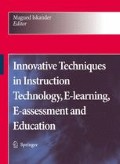Abstract
W The article presents examples of application for programmable devices to control several simple models of physical objects. During the digital logic classes students from Faculty of Marine Electrical Engineering become familiar with designing digital control systems. During laboratory sessions students create control systems for models and realize particular assignments with application of programmable logic devices.
Access this chapter
Tax calculation will be finalised at checkout
Purchases are for personal use only
Preview
Unable to display preview. Download preview PDF.
References
Altera Corporation website: http://www.altera.com.
Xilinx Inc. website: http://www.xilinx.com.
Altera Corporation, Quick Start Guide For Quartus II Software, electronic version, 2006.
Altera Corporation, Quartus II Version 6.0 HandbookVolume 1: Design&Synthesis, electronic version, May 2006.
Altera Corporation, Quartus II Introduction Using VHDL Design, electronic version, 2005.
Altera Corporation, Quartus II Simulation with VHDL Designs, electronic version, 2005.
Kamami website: http://www.kamami.pl.
K. Noga, Laboratory of Digital Logic, 3rd ed., Gdynia Maritime University Press, 2005, in Polish.
Allegro internet auctions: http://www.allegro.pl.
Terasic Technolgy Company website: http://www.terasic.com.tw.
Altera Corporation, DE2 Development and Education Board, electronic version, 2006.
Altera Corporation, DE2 Development and Education Board User Manual, electronic version, 2006.
Robosapien website: http://www.therobosapien.com
WowWee website: http://www.robosapienonline.com
WowWee Ltd., Robosapien User’s Manual, electronic version, 2004.
P. Ptach, S. Sieranski, Control of selected object with utilization of programmable devices, 1st degree thesis, GMU, Department of Ship Automation, 2007, in Polish
T. Derkowski, L. Legowski, Control of robot-human ROBOWISDOM with utilization of VHDL language and Altera DE2 education board, 2nd degree thesis, GMU, Department of Ship Automation, 2007, in Polish
M. Smietanko, P. Welnicki, Implementation of control system of vehicle model in programmable devices using Altera DE2 education board, 2nd degree thesis, GMU, Department of Ship Automation, 2007, in Polish
Authors’ website: http://www.am.gdynia.pl/~jagat.
Author information
Authors and Affiliations
Editor information
Editors and Affiliations
Rights and permissions
Copyright information
© 2008 Springer Science+Business Media B.V.
About this paper
Cite this paper
Noga, K.M., Radwanski, M. (2008). Our Stations for Teaching Programmable Devices. In: Iskander, M. (eds) Innovative Techniques in Instruction Technology, E-learning, E-assessment, and Education. Springer, Dordrecht. https://doi.org/10.1007/978-1-4020-8739-4_47
Download citation
DOI: https://doi.org/10.1007/978-1-4020-8739-4_47
Publisher Name: Springer, Dordrecht
Print ISBN: 978-1-4020-8738-7
Online ISBN: 978-1-4020-8739-4
eBook Packages: Computer ScienceComputer Science (R0)

